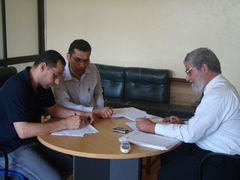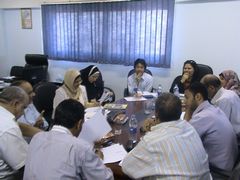- Home
- Technical Cooperation Projects
- Index of Countries
- Middle East
- Egypt
- Project for Strengthening Water Management Transfer
- Project News
- Needs Survey was Implemented for Trainings on Water Management Transfer.
Project News
2013-06-19
Needs Survey was Implemented for Trainings on Water Management Transfer.
The Project for Strengthening Water Management Transfer (the SWMT Project) implemented the needs survey for trainings on Water Management Transfer from February to June, 2013. Main purposes of the needs survey were to collect and analyze data and information not only on the current situations of trainings on Water Management (WM) and Water Users' Organizations (WUOs) conducted by the Counterparts (CPs) including Central Department of Irrigation Advisory Service (CDIAS) and Training Sector for Water Resources and Irrigation (TSWRI) in Ministry of Water Resources and Irrigation (MWRI) as well as by other projects, but also on training resources which can be utilized for the upcoming trainings of the SWMT Project.
As the first step of the needs survey, documents and reports available on the WM and WUOs were collected from the CPs and the other projects and analyzed, while JICA expert's team got more detailed information about trainings from stakeholders of the other projects including Water Management Reform Program in Phase II (WMRP II) of GIZ and Integrated Water Resource Management Project (LIFE-IWRM) of the USAID.
After the first documentary review, the needs survey was implemented for 44 counterparts (CPs) in MWRI including staffs of the CDIAS, TSWRI as well as General Directorate of Irrigation Advisory Service (GDIAS) in charge of 3 pilot sites by asking them to fill in the questionnaire on trainings on WM and WUOs.
As a result of the needs survey, the SWMT Project had main findings as below.
- Since several projects have been implemented trainings on water management by their own different approaches and methods, many training materials were also developed for their own individual project activities. As a result, it has happened that several projects developed the different training materials for the same topics.
- Training materials were utilized only for the projects in which they were developed and were being kept by individuals after the projects.
- The CPs in the central offices did not always have more training experiences than the CPs in the regional offices.
- There were many CPs who participated in trainings as a CP of the former technical cooperation projects including the JICA's, but have not been able to make full use of the training skills and knowledge for their current works.
- While different training needs on WM and WUOs were raised by each CP of the MWRI, training topics whose needs were considered to be generally high by the CPs were Water quantity management, Water quality management and Participatory Water Management.
 TSWRI staffs filling in the questionnaire.
TSWRI staffs filling in the questionnaire.
 Staffs of the GDIAS West Delta filling in the questionnaire.
Staffs of the GDIAS West Delta filling in the questionnaire.
Based on the results of the needs survey above, the SWMT Project will plan and implement its own trainings by following the strategies below in cooperation with a short term expert to be dispatched to the project in preparing for the training program.
- To develop training materials which the CPs can continuously utilize for their work even after the end of the SWMT Project by making full use of the training materials which were already developed by the other projects.
- To plan and implement the TOTs which meet the training needs of staffs in the CDIAS and the TSWRI so that they can effectively train the local CPs on WMT, while implementing the trainings for the GDIAS by fully considering the local diverse training needs.
- To plan and implement every training by making full use of practical knowledge and skills that the CPs learned and training materials in the former trainings, aiming at establishing the integrated and sustainable training system for the MWRI.
- About JICA
- News & Features
- Countries & Regions
- Our Work
- Thematic Issues
- Types of Assistance
- Partnerships with Other Development Partners
- Climate Change / Environmental and Social Considerations
- Evaluations
- Compliance and Anti-corruption
- Science and Technology Cooperation on Global Issues
- Research
- JICA Development Studies Program / JICA Chair
- Support for the Acceptance of Foreign HRs / Multicultural and Inclusive Community
- Publications
- Investor Relations
